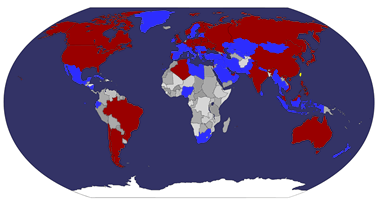Taiwan is a mountainous island, with more than 200 mountains above 3,000 meters. With the wide range of vertical climatic zones on these mountains—from tropical and subtropical to temperate and cold—come some very diverse forests. Alpine plants grow in areas 3,000 meters above sea level. Constantly exposed to strong ultraviolet radiation, the blooms of these plants are brilliantly colorful. To introduce the beauty of Taiwan’s alpine flowers, Chunghwa Post is issuing a set of four stamps on these flowers. The designs follow:
1. Gentiana scabrida var. punctulata (NT$5): The plant can be found in open meadows and gravelly slopes in high elevation areas of the Central Mountain Range. Each branch typically produces one or two (and occasionally three) terminal flowers. The blooms have yellow campanulate calyx and corolla, with black spots at the base of the petals. Though small, when a colony of these colorful exquisite flowers is in full bloom, the sight is simply breathtaking.
2. Euphrasia transmorrisonensis (NT$5): The plant can be found at high elevations. Its Chinese name literally means “millet grass,” either because its small seeds resemble millet or the two yellow marks on the flower’s lip resemble millet. Its flowers are arranged in racemes, with very short pedicels. Each of its tiny delicate white flowers has four tubular or campanulate sepals and a smidgen of yellow on its corolla.
3. Clematis montana (NT$10): The plant can be found creeping in meadows or scrambling over shrubs on the sunny side of mountains at high elevations. The elegant white flower’s four large petal-like surfaces are actually its white sepals. The pale yellow filaments in the center of its blossoms are its stamen and pistil.
4. Cypripedium formosanum (NT$10): The plant can be found in moist forests on high elevation mountains. Its flowers are borne singly. The ovate lanceolate upper sepals of this showy flower are shell pink with pink veins. Bees enter through the opening of its bulging pouch-shaped labellum to carry out the task of pollination. In Chinese, the plant is nicknamed “umbrella” because its flower is shaped like one. And because its labellum resembles a slipper, the plant is also called Japanese lady’s slipper and Formosa lady’s slipper.
"50 years of reestablishment of diplomatic relations" joint s/s with India,
on FDC from Portugal
-
*Bloc-feuillet "50 ans du rétablissement de relations diplomatiques",
commun avec l'Inde, sur FDC du Portugal *
L'Inde et le Portugal entretiennent des r...
14 hours ago




































 taiwan
taiwan  cover or postcard
cover or postcard  FDC
FDC 





























































































